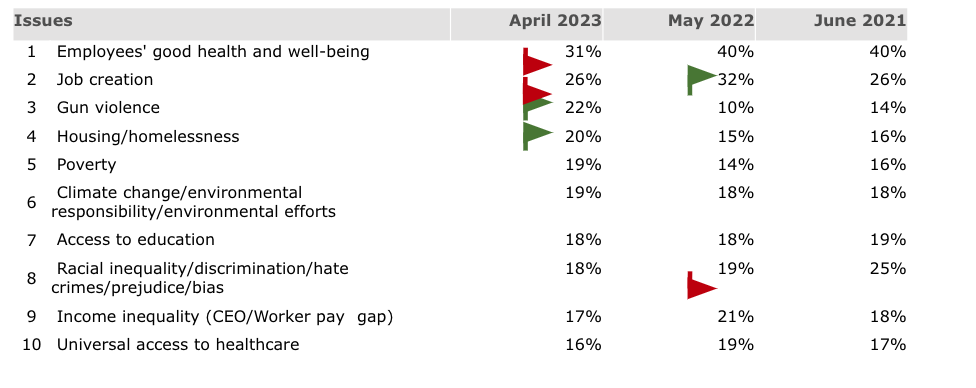
This blog is provided by the IPR Organizational Communication Research Center.
My agency conducts the Integral Employee Activation Index study annually with The Harris Poll to understand employee mindset and behaviors. We just did a pulse check and the results stunned me. Employees’ expectations about the issues their employer takes a stand on changed drastically.
The study gathers input from employed individuals across the United States from a wide variety of industries, career levels, genders, generations, and racial/ethnic backgrounds. Results represent employee attitudes about company values, differences between managers and non-managers, digital transformation, politics in the workplace, and more.
In a nutshell, our study is somewhere between a peek into the minds and behaviors of a workforce and a predictor for what will resonate with the working public.
In the study, we explore the societal and political issues employees believe are most important for their employer to make a difference on. For the past two years “Employees’ good health and well-being” and “Job creation” topped the list, followed variously by racial and gender inequity, data privacy, income inequality, and universal access to healthcare. We’ve found that when employee values align with organizational priorities all kinds of positive activities occur. And when they don’t? Employees are more likely to take action against their employers.
In April, we conducted a study of 1,200 employees across the country. We wanted to understand if or how employee priorities shifted since we conducted the 2022 survey.
What we found changed our minds. And our assumptions.
Why? This April, gun violence, housing issues, and poverty displaced other issues and rocketed into the top five issues. While we can’t prove causality, we see a high correlation between the responses to our study and what was going on in the world. Housing affordability is way down. Mass shooting deaths year-to-date are way up. Concern about COVID-19 is somewhat diminished.
The workplace reflects our culture. We know that. And make no mistake: gun violence, poverty and housing are workplace issues that employers want employers to make a difference on. Regardless of your personal stance on these issues, employees want their company to do something. Why? Because they see these as salient to their relationship with their employer. It’s about ensuring employee safety and wellness and bringing meaning to day-to-day work.

Top ten: Which issues should your employer make a difference on?
So what are you going to do about gun violence?
The BBC reports that the number of mass shootings has gone up significantly in recent years, citing statistics from the Gun Violence Archive. Every day, 321 people are shot in the United States, according to Brady United. Companies are not exempt from gun violence. Everytown for Gun Safety* reflects that since 1999 there have been nearly four times as many mass shootings in the workplace as there have been in schools. Fifty-eight percent of American adults or someone they care for have experienced gun violence in their lifetime, meaning that it is highly likely our colleagues, employees, and customers have experienced gun violence. I wrote a blog post back in June 2022 on Second Amendment Rights vs. Gun Violence: Workplace Polarization, I stressed that companies need to understand what their employees care about and value.
There are ways for your organization to get involved if you’re interested in finding ways to protect your employees and customers or promoting gun safety through business practices. As an example, in 2016, Levi Strauss & Co. prohibited consumers from bringing guns into their stores. In January 2019, CEO Chip Bergh joined other CEOs in support of H.R. 8 to require background checks on all gun sales.
Additionally impacting employees and businesses, communities experiencing gun violence are less likely to be hubs for economic growth and commerce, and face lower property values, fewer business startups and loss of jobs.
So what are you going to do about housing and poverty?
Another issue facing employees, your people, is housing. Stable, safe, and secure housing is fundamental to employees’ ability to perform their roles well.
The post-pandemic housing economy is negatively impacting people across the country. The last year saw a sizzling housing market marked by lower than normal inventory, fast-selling homes, and steadily increasing property prices that favor sellers, not buyers. What might this mean for your employees?
Perhaps organizations provide a cost of living adjustment for certain segments of your employee population to ensure that they have stable housing? With employee frustration over their pay, Amazon is going to let employees pledge stock for home loans.
Another consideration is the Employer Assisted Housing (EAH) down payment assistance program created by Fannie Mae in 1991. The EAH can help companies cut employee turnover in half and save as much money as it costs. It works by providing qualified employees’ funds for downpayment and closing costs as a loan that is forgiven over a period of time, as long as the recipient stays with the employer. This may also have the added benefit of ameliorating the racial homeownership gap.
The Society for Human Resources Management (SHRM) details that some employers are starting to offer home-buying support benefits, which assists workers to reach their homeownership dreams. This, in turn, bolsters recruiting, hiring, and retention of employees. Something employees indicate they care about.
When you develop your employer value proposition, it’s time to go far further than decent dental and vision benefits!
What we learned & what we can do
Headlines drive your workplace experience because they are employee experience issues. The workplace experience is where employees have a societal experience.
Organizations have the power to influence change — through content, interactions, policies, and directing the powerful energy of capital with purposeful strategic intent. When we consider employee experience broadly, we can impact important societal issues. And it’s not all upside because inaction and inattention comes with the risk of moral hazard and losing your best people to companies making a difference.
Find the original blog post here.

Ethan McCarty is the CEO of Integral, an award-winning Employee Experience Agency. He lectures at Columbia University in New York City and is a member of the Forbes Business Council. He currently is a member of the Institute for Public Relation’s Board of Trustees and is Director of the IPR Organizational Communication Research Center.



